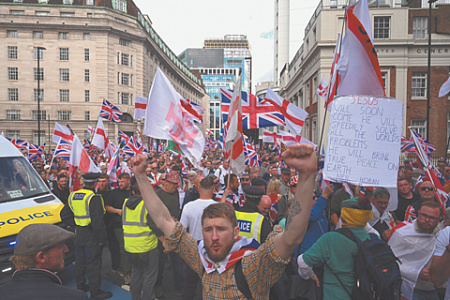
A massive anti-immigration demonstration swelled through the streets of London, drawing what police estimate to be over 100,000 people and signaling a dramatic surge in support for the UK’s far-right. The “Unite the Kingdom” march, led by prominent activist Tommy Robinson, starkly contrasted with counter-protests organized by unions and anti-fascist groups, which gathered only a few thousand. The day was marked by tension, with police reporting several officers were injured after being pelted with bottles as some demonstrators attempted to breach police lines.
This street-level movement mirrors a seismic shift in the United Kingdom’s formal political arena. Recent polls indicate that Reform UK, a populist party led by Brexit architect Nigel Farage, has become the country’s most popular political force. This unprecedented development directly challenges the century-old dominance of the Labour and Conservative parties, suggesting the nation’s political bedrock is fracturing under the weight of populist discontent. With four years until the next general election, Farage is positioning himself for a potential run for Prime Minister.
The London rally also drew international attention with the participation of billionaire Elon Musk, fueling speculation about his political interests. At the event’s helm was Tommy Robinson, a figure who rose from relative obscurity as the founder of the Islamophobic street-protest group, the English Defence League, to a nationally recognized and highly divisive media personality. He told supporters that migrants now have more rights in court than native Britons, a claim that resonates with his base.
The rising influence of figures like Farage and Robinson is fueled by deep-seated public anxiety over immigration. Despite data showing migrants often fill essential, low-wage jobs, the narrative that they take jobs from Britons and strain public services finds a wide audience. This sentiment is further inflamed by high-profile crimes involving migrants and public anger over the policy of housing asylum seekers in hotels, issues which have become potent rallying cries for the far-right.
Ultimately, the surge is being enabled by a perceived failure of the political mainstream. The Conservative Party, which governed from 2010 to 2024, is in crisis after failing to deliver on key promises, particularly controlling immigration. The current Labour government is now seen as struggling with the same challenges, especially the near-daily arrival of small boats carrying migrants across the English Channel. With both major parties appearing unable to provide effective solutions, this political vacuum is being decisively filled by a third force offering hardline answers to the country’s most polarizing questions.
